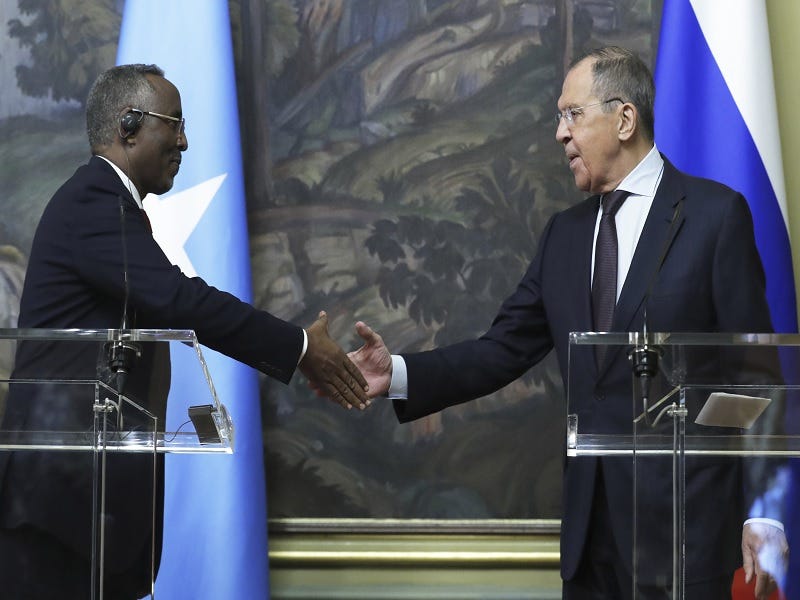Somalia’s top priority is to fully restore its sovereignty by defeating Al Shabaab, thus guaranteeing the withdrawal of those international forces that are currently stationed in the country on the pretext of fighting them, and then finally resolving the Somaliland issue. Anything that can place it on this path, such as Russian arms and speculative Wagner training, would be appreciated.
Russian Foreign Minister Sergey Lavrov informed the press on Friday following talks with his Somali counterpart Abshir Omar Jama on Friday that “We reaffirmed our commitment to meeting the needs of the Somali National Army for the equipment they need to complete their fight against terrorists.” This remark is much more important than it might appear at first glance for the reasons that will be explained in this analysis.
For starters, the dispatch of military equipment usually entails training programs too, thus implying a deeper expansion of military ties. Should this come to pass, then there’s a credible chance that it could involve more than just conventional Russian forces since Wagner has already established an impressive reputation in Africa for its “Democratic Security” services, which refers to counter-Hybrid Warfare tactics and strategies aimed at protecting national models of democracy from such threats.
This group already succeeded in stabilizing the Central African Republic (CAR) and is presently making progress in helping newly anti-imperialist Mali too. France and the US are furious with Russia strengthening fragile African states’ sovereignty, which is why they’re now waging their own Hybrid War against Wagner in Africa, including via disinformation-driven sanctions intended to serve as the gateway for other more direct forms of meddling such as arming anti-government groups.
Somalia obviously hasn’t been deterred by these foreign pressure campaigns in spite of voting against Russia at the UNGA over the past 15 months since the start of its special operation. This speaks to Mogadishu’s pragmatism in still appreciating how important of a security partner Moscow could be due to its positive track record in the CAR and Mali. Likewise, it shows that the Kremlin is pragmatic too since it could have refused to cooperate with Somalia in this sphere after its partner’s UNGA votes.
This East African country wants to continue diversifying its security partnerships, which currently include close ties with Turkiye and its Qatari ally, while relations with the UAE have recently entered a rapprochement and ties with the US remain complicated. It makes perfect sense from Somalia’s perspective to give Russia a shot at helping to solve its serious security problems that continue to threaten its sovereignty and thus the broader region as a whole.
As for Russia, succeeding where the US failed would boost its prestige, especially since this would prove that its “Democratic Security” services played a pivotal role in ending one of Africa’s longest conflicts. About that, Wagner chief Yevgeny Prigozhin hinted on Telegram that some of his fighters could soon return to Africa, which could defuse tensions with the Defense Ministry and see the most battle-hardened forces in the world training the Somali National Army if sent there as part of a package deal.
Nobody should get their hopes up, but in the event that any progress is achieved, then it would help strengthen the Horn. Somalia’s top priority is to fully restore its sovereignty by defeating Al Shabaab, thus guaranteeing the withdrawal of those international forces that are currently stationed in the country on the pretext of fighting them, and then finally resolving the Somaliland issue. Anything that can place it on this path, such as Russian arms and speculative Wagner training, would be appreciated.
All responsible regional stakeholders would benefit from any steps that Somalia makes in this direction, especially Ethiopia and Kenya, which are threatened by Al Shabaab and have even dispatched troops to their joint neighbor for the purpose of fighting that group. They and the others that comprise the “African Union Transitional Mission in Somalia” (ATMIS) are scheduled to fully withdraw by December 2024, but they’d feel much more secure if Somalia makes meaningful anti-terrorist progress before then.
Without accomplishing this first goal, the scenario of foreign intervention will forever hang over Somalia like a Damocles’ sword, to say nothing of the impossibility of it ever resolving the Somaliland issue one way or another. When analyzed in this way, it can therefore be concluded that Russia’s reaffirmation of arms support for Somalia in its fight against terrorism and the associated scenario of Wagner training services being included as part of a package deal amounts to an attempt to fully restore the Somali state.




